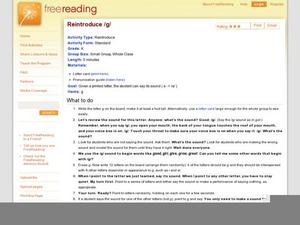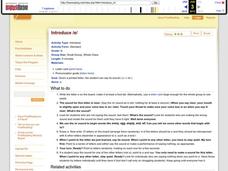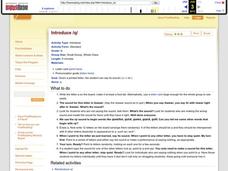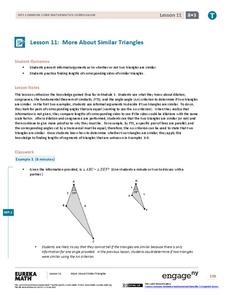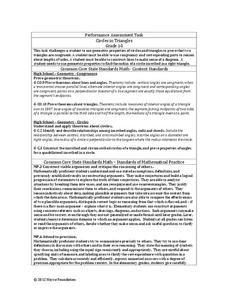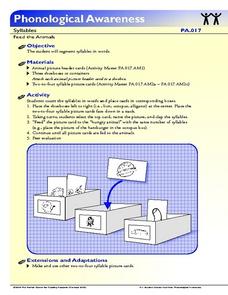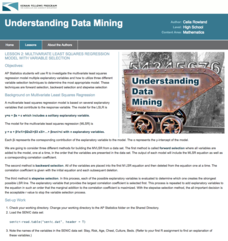Curated OER
Reintroduce g
Synthesize pronunciation, recognition, letter sound, and word examples as scholars learn all there is about the letter g. They examine the letter shape and listen to you pronounce the hard /g/ sound. As you explain how this sound is...
Curated OER
Introduce /e/
Examine the most-used letter in the English language incorporating pronunciation, letter recognition, letter sound, and word examples for the letter e. Scholars examine the letter shape and listen to you pronounce the /eee/...
Curated OER
Introduce /Q/
Everything your pre-readers need to know about the letter Q is right here; this strategy combines pronunciation, letter recognition, sound, and word examples. Scholars examine the letter shape and listen to you pronounce the /kwww/...
Curated OER
Phonemic Awareness: Blending
First graders listen closely as their teacher sounds out a variety of words, one phoneme at a time. They then practice blending sounds to create words on their own. Tip: While you sound out words have your class write down each phoneme...
EngageNY
More About Similar Triangles
Determine whether two triangles are similar. The lesson presents opportunities for pupils to find the criterion needed to show that two triangles are similar. Scholars use the definition of similarity to find any missing side...
Curated OER
Congruency
Which triangles are congruent? There are two sets of triangles here for scholars to examine in order to determine which of them are congruent. They use an example and explanatory introduction to guide them through this process. The first...
EngageNY
Solve for Unknown Angles—Transversals
Lead your class on an exciting journey through the world of math as they review geometry facts and solve for unknown angles. They learn how to use auxiliary lines and congruent angles to correctly complete each practice problem...
Inside Mathematics
Circles in Triangles
Challenge the class with inscribed circles in triangles. The assessment task requests class members use their knowledge of circles and right triangles to prove two triangles are congruent. They go on to utilize their knowledge of...
Florida Center for Reading Research
Phonological Awareness - Phoneme Segmenting and Blending, Treasure Chest
Working in pairs, scholars use picture cards to practice segmenting words into phonemes and blending phonemes into words. When a peer answers correctly they place a penny in a treasure chest. Incorrect responses make the card go back in...
Inside Mathematics
Hopewell Geometry
The Hopewell people of the central Ohio Valley used right triangles in the construction of earthworks. Pupils use the Pythagorean Theorem to determine missing dimensions of right triangles used by the Hopewell people. The assessment task...
Florida Center for Reading Research
Phonological Awareness: Syllables, Feed the Animals
An activity challenges scholars to sort picture cards based on the number of syllables they count as they say the item's name on each card. Depending on how many syllables they count, they place the card in the corresponding box...
EngageNY
Informal Proof of AA Criterion for Similarity
What does it take to show two triangles are similar? The 11th segment in a series of 16 introduces the AA Criterion for Similarity. A discussion provides an informal proof of the theorem. Exercises and problems require scholars to apply...
California Education Partners
Science Fair Project
Plant the data firmly on the graph. Given information about the growth rate of plants, pupils determine the heights at specific times and graph the data. Using the information, scholars determine whether a statement is true and support...
Kenan Fellows
Multivariate Least Squares Regression Model with Variable Selection
The risk of contracting an infection in the hospital is low, but it does happen. Learn what risk factors have the highest correlation with hospital-acquired infections in the final lesson plan of a three-part series. Using the open...
EngageNY
Sequencing Rotations
Discover the result of a sequence of rotations about different centers. Pupils perform rotations to examine the patterns. They also describe the sequence of rotations that performed to reach a desired result in the ninth installment in a...
Balanced Assessment
A Loud Noise
In a scale measuring noise, an increase in 10 dB is a 10 time increase in power. Mathematicians examine the data graph of a real world exponential growth, with no logarithmic scale, and then create two equations relating the...
PBL Pathways
Medical Insurance
Design a plan for finding the best health insurance for your money. Learners compare two health plans by writing and graphing piecewise functions representing the plan rules. Using Excel software, they create a technical report...
California Education Partners
Yum Yum Cereal
Design an efficient cereal box. Scholars use set volume criteria to design a cereal box by applying their knowledge of surface area to determine the cost to create the box. They then determine whether their designs will fit on...
EngageNY
Properties of Parallelograms
Everyone knows that opposite sides of a parallelogram are congruent, but can you prove it? Challenge pupils to use triangle congruence to prove properties of quadrilaterals. Learners complete formal two-column proofs before moving on to...
EngageNY
Dilations from Different Centers
Can you follow a composition of transformations, or better yet construct them? Young mathematicians analyze the composition of dilations, examining both the scale factor and centers of dilations. They discover relationships for both...
Inside Mathematics
Winning Spinners
Winning a spin game is random chance, right? Pupils create a table to determine the sample space of spinning two spinners. Individuals determine the probability of winning a game and then modify the spinners to increase the probability...
Illustrative Mathematics
Making a Clock
Have a fun time teaching children to read analog clocks with this whole-group math activity. Using large sets of the numerals 1-12 and 0, 5, 10...55, the teacher creates a large clock on either the carpet or the white board, explaining...
Florida Center for Reading Research
Phonological Awareness: Phoneme Segmenting, Phoneme Closed Sort
Build phonological awareness with an activity that challenges learners to sort picture cards based on the number of phonemes each has.
Curated OER
Practice: Word Problems
Congratulations, you've just hit the word problem jackpot! Covering an incredible range of topics from integers and fractions, to percents, geometry, and much more, this collection of worksheets will keep young mathematicians...
